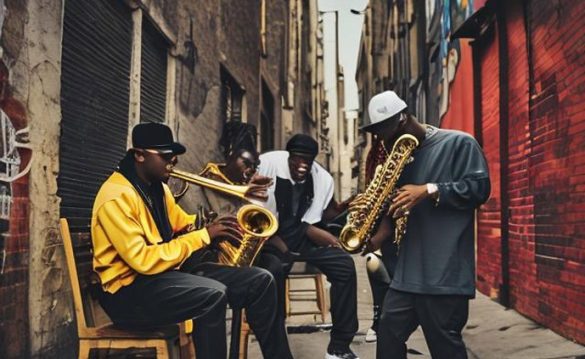Jazz and Hip Hop, two distinct and influential genres that have made an everlasting impact on the music landscape, might initially appear to be worlds apart. However, upon closer examination, a profound and captivating relationship emerges, one that has continuously evolved over the years. We will delve deep into the intertwined history, influences, and creative connections between Jazz and Hip Hop, showcasing the remarkable and harmonious evolution that has taken place.
The Roots of Jazz
Jazz, born in the early 20th century, emerged as a vibrant and dynamic musical expression firmly rooted in the rich tapestry of African American culture. With its unparalleled improvisational nature and unwavering focus on rhythm, Jazz became an immensely powerful outlet for self-expression and an undeniable catalyst for social change. Legendary artists such as Louis Armstrong, Duke Ellington, and Ella Fitzgerald played pivotal roles in paving the way for future musical innovations.
One of the earliest examples of the connection between jazz and hip hop can be found in the music of Gil Scott-Heron. Scott-Heron was a poet, musician, and activist who is considered one of the pioneers of hip hop. His music often combined spoken word with jazz instrumentation, and he was a vocal advocate for social justice.
Another early influence was the Last Poets, a group of spoken word artists who were also influenced by jazz. The Last Poets’ music was raw and political, and it helped to pave the way for the more socially conscious hip hop artists of the 1980s and 1990s.
The Birth of Hip Hop
In the late 1970s, a groundbreaking musical movement sprung forth from the bustling streets of New York City. Hip Hop, with its infectious and energetic beats, thought-provoking and poetic lyrics, and a compelling emphasis on storytelling, seamlessly captured the voice of an entire generation. Drawing inspiration from the African American oral tradition and the vibrant DJ culture, Hip Hop pioneers like DJ Kool Herc, Grandmaster Flash, and Run-DMC laid down the foundation for an unprecedented revolution in the realm of music.
Jazz and Hip Hop Meet
As Hip Hop rapidly gained popularity and influence, artists began to embark on a sonic exploration, venturing into uncharted territories and seeking inspiration from an array of genres, including Jazz. In the 1980s, the advent of sampling technology allowed hip hop artists to incorporate even more jazz elements into their music. Sampling allowed artists to take short clips of jazz recordings and loop them, creating new and original beats. This led to the creation of a new subgenre of hip hop called “jazz rap,” which featured heavy use of jazz samples. The fusion of meticulously sampled Jazz melodies, captivating live instrumentation, and the infectious beats of Hip Hop became a defining characteristic of the genre. Visionary acts such as A Tribe Called Quest, The Roots, De La Soul and Guru’s Jazzmatazz project skillfully intertwined the improvisational spirit of Jazz with the pulsating rhythmic intensity of Hip Hop, thereby birthing a vibrant and entirely new sonic palette.
Creative Cross-Pollination
The relationship between Jazz and Hip Hop extends far beyond mere sampling. Jazz musicians, captivated by the boundless energy and unparalleled creativity of Hip Hop, began incorporating elements of the genre into their own artistic endeavors. Noteworthy artists like Robert Glasper, Kamasi Washington, and Christian Scott aTunde Adjuah fearlessly infused their Jazz compositions with the infectious rhythms and collaborative spirit of Hip Hop, effectively bridging the perceived gap between the two genres.
Some of the most notable collaborations include:
- Herbie Hancock and Kendrick Lamar on the album To Pimp a Butterfly
- Robert Glasper and Common on the album Black Radio
- Thundercat and Flying Lotus on the album Cosmos Fetus
- Guru on the album Jazzmatazz
Cultural and Social Connectivity
Jazz and Hip Hop have both emerged as dynamic and influential vehicles for cultural and social commentary. These genres have provided an essential platform for amplifying the voices of marginalized communities and shedding light on pressing societal issues. Through their evocative music, artists have fearlessly addressed topics such as racial inequality, social justice, and personal struggles, forging an unbreakable connection that transcends the boundaries of time and genre.


